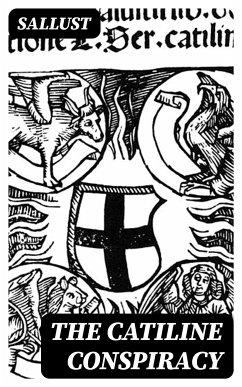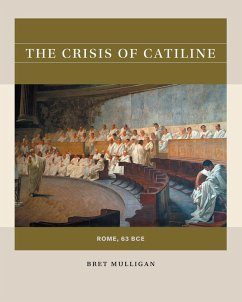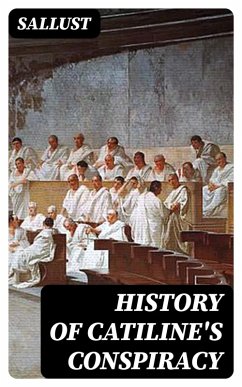
Conspiracy of Catiline and the Jurgurthine War (eBook, ePUB)
Versandkostenfrei!
Sofort per Download lieferbar
1,99 €
inkl. MwSt.
Weitere Ausgaben:

PAYBACK Punkte
0 °P sammeln!
In 'Conspiracy of Catiline and the Jugurthine War,' Sallust presents a compelling examination of political intrigue and moral corruption in the late Roman Republic. The work is characterized by its concise yet impactful prose, a hallmark of Sallust's literary style, which combines historical narrative with deep psychological insight into his subjects. Through the lens of the Catiline conspiracy, Sallust not only chronicles the events leading to the attempted coup but also critiques the societal decline that allowed such treachery to flourish. The juxtaposition of the Catiline narrative with th...
In 'Conspiracy of Catiline and the Jugurthine War,' Sallust presents a compelling examination of political intrigue and moral corruption in the late Roman Republic. The work is characterized by its concise yet impactful prose, a hallmark of Sallust's literary style, which combines historical narrative with deep psychological insight into his subjects. Through the lens of the Catiline conspiracy, Sallust not only chronicles the events leading to the attempted coup but also critiques the societal decline that allowed such treachery to flourish. The juxtaposition of the Catiline narrative with that of Jugurtha, a King of Numidia, further emphasizes themes of ambition, greed, and the complex interplay of personal and political motives that defined this tumultuous period in Roman history. Sallust, a contemporary of Cicero and a senator himself, was deeply influenced by the political dynamics of his time, including the moral decay he perceived in Rome's institutions. His experiences as both a soldier and politician imbued his writing with a sense of urgency and authority, as he sought to shed light on the moral failings that facilitated the rise of corruption and tyranny. This dual perspective enriches the historical narrative, giving readers an intimate glimpse into the era's political landscape. This work is essential for anyone seeking to understand the intricate complexities of Roman politics and the timeless nature of power struggles. Sallust's incisive analysis and evocative storytelling provide profound insights into the consequences of ambition and betrayal, making 'Conspiracy of Catiline and the Jugurthine War' a must-read for historians, classicists, and anyone intrigued by the darker facets of human nature.
Dieser Download kann aus rechtlichen Gründen nur mit Rechnungsadresse in A, B, BG, CY, CZ, D, DK, EW, E, FIN, F, GR, H, IRL, I, LT, L, LR, M, NL, PL, P, R, S, SLO, SK ausgeliefert werden.













